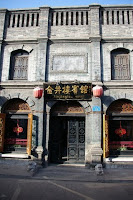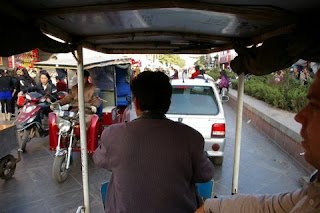October 22nd.
Woke up at 6:17am in some kind of coffin that makes clacking noises. Feet rammed at an angle over some kind block to avoid comfort. On further inspection, am sleeping on the top bunk of a Chinese hard-sleeper. Not sure where we are and we keep making stops at places marked only in Chinese characters. After a few village stops, spot a sign `Tai Yuan Dong`. Taiyuan is 1-2 hours from our destination, Pingyao, so all is well. We have woken up in time to watch most of Taiyuan roll past. It looks like something from a movie of a post-apocalyptic future. "rat-hole without the charm" also comes to mind. Industrial, polluted, and poor looking. Maybe it`s just along the train tracks, but the buildings look like something the communist party partially built, then gave up on, and then left to find their own identity. Many seem on the verge of collapse. Others are actively involved in collapsing. Naturally they all appear occupied. This is very much the bad stereotype of China come to life in the dawn light.
We rattle on past in search of Pingyao. Everyone slept a little so in general we seem to be better off than expected. We are definitely better off than the lady who spent the night with a single bed for her and both her children!! Eventually we get to Pingyao and pick up a free three-wheeled device (a modern griffin, with the head of a motorcyle, the body of a horse-drawn cart and a back all of benches) to take us to the Harmony Guesthouse. There are a number of guys waiting for blearly-eyed trainrats so they can scoop us up and take us to their various hostels and hotels. The Harmony Guesthouse is highly recommended by both Lonely Planet and Frommers China so we take a ride to it. Along the way we see the soon-to-be-legendary Sewer Horse for the first time.
Harmony Guesthouse proves to be a very nice looking courtyard style house. Unfortunately there is a rather terrible smell on arrival and we are rapidly shuffled off to the old location. The old location has bunks that are fairly nasty and no private rooms. The new location will supposedly be ready in a few hours but we want to see it now. When we got to look, there is raw sewage welling up in the middle of the courtyard and the smell has thoroughly permeated the rooms. The proprietor figures they'll be ready for use again in a few hours but we figure it'll take a week for this stuff to smell normal again so we decline their offer and go in search of other accomodations. It becomes apparent that the guy who ferried us from the train station may take kickbacks from more than one hotel as he immediately suggests an alternative and offers to drive us. We end up at the Jin Jing Lou Hotel, another courtyard style hotel. We were able to get two rather enormous beds in very simple rooms with rather basic amenities for ¥300. After a few moments discussion the price was ¥200 (about $32) for both rooms, which seemed rediculously resonable, so we took it. After a quick wash up we walked into their living room (free wifi :) and dropped ¥70 on breakfast. This is probably why they drop the room prices so easily; they must think western tourists are idiots. We probably are but we enjoy it! Breakfast came with the worst coffee in existance, but we were all starting to feel better. After a quick trip back to the rooms for very short showers (no hot water!), it was time to see Pingyao.
The appeal of Pingyao is that it is an ancient walled city. Out hotel is within the walled area and just outside is a touristy street. Pavan loved the vendor immediatley outside being an elephant statuarium.
The town has a two day pass to the walls plus 18 or so historic buildings and we set off to find out where to buy this pass. Along the way we saw Chinese fish-keeping. The keeping of far too many fish in water with no aeration has been common the whole trip (in Beijing the hostel staff thought the fish were always hungry when in fact they were gasping for air) but this example was just funny.
We saw some neat stuff but no ticket office. Eventually we found a restaurant recommended by a guidebook, De Ju Yuan, and stopped for lunch. It was good. Very good in fact. Best wonton soup we've had, and they do some really good "mountain noodle" dishes too. Excellent food for quite cheap is awesome.
Feeling restored, we headed for the city walls. Along the way we found the ticket booth for the city pass and bought our tickets. Unfortunately shortly after we reached the walls Pavan's stomach felt a little funny so she had to head back to the hotel. We wanted to walk her but she was not having any of it. She was so vigerous in protesting the notion that one might be excused for disbelieving her claim to feel sick. Eventually we agreed that Rod and Chris will walk along the wall and then go try to buy train tickets for the next night to Xi'an (we'd been warned these tickets are hard to come by) and then meet Pavan back at the hostel. The wall has lots of little towers, each of which supposedly has a paragraph from The Art of War. This may be true, but if so it is well hidden.
One of the more novel views from the wall was a building that was apparently ordered boarded up at a time when boards were scarce. The solution: take a tree, hack it into crude pieces, and nail it up!
As soon as you get outside the city walls (necessary to reach the train station) the brow drops. Instead of what might be described as charmingly touristy it becomes ghetto touristy, with tons of stalls setting stuff so crappy it's almost insulting to tourists. A local speciality seems to be the refridgerator trap. This is a cunning mechanism involving placing water bottles in what superficially appears to be a normal beverage fridge but not actually plugging it in so when a naive victim reaches in hoping for a cool water they get one that has been sitting in a hot box for several hours instead. It was around this point that we realized that Pingyao is actually dustier than Beijing - and Beijing is pretty dusty!!
On reaching the train station we worriedly waited in line, eventually got to the front, and had a totally anti-climactic ticket buying experience. The clerk was very skilled at dealing with limited-Mandarin types and we were easily able to buy tickets for tomorrow night at 11pm headed to Xi'an for ¥83 each. We grabbed a rickshaw back, though Rod's proportions nearly make this a no-go.
The price for the ride back was ¥20. It initially looked like we wouldn't get much past the gate as there was a low fence blocking our way and the rickshaw had absolutely no shocks or off-road capabilities. Or so we thought ... apparently by flooring it you can careen in semi-control over the barrier and get into the city. We later learned there is an alternate, but slightly longer, route that does not involve this trick. On arrival back in the city the driver claimed the price was actually ¥20 each. We were sure this was not the case but the cost is so low we couldn't be bothered to put up much of a fight and just pay. This was probably central to his business but hey ... he probably needed it more than we did.
We collected Pavan, now feeling somewhat better, and decided to go see some of the 18 buildings deemed of historical significance that are included in our city pass. We rapidly realized that the map we got matches the streets perfectly but the locations it shows for attractions are at best close and in some cases just wrong. One building we want to see is just missing; we never find it despite a fairly extensive search. Others are substantially off where the map places them. This ultimately turns out to be more fun that just going to them map by map would be - we wander around the main streets, going into whatever historic sites we happen to find the entrances to. Along the way we passed through a shop where a guy was painting traditional style paintings that were rather nice.
Possibly a result of sleep deprivation, sewer horse kept coming up in jokes. Plus we saw him again. Soon we had established him as a key figure in an elaborate Pingyao myth. Sadly the myth was not put down on paper. We all loved Pingyao. The vendor-streets were much quieter and more laid back than Beijings, and you never know when you are going to find the entrance to a historic building. It's dusty as hell, haunted by the sewer horse, and highly enjoyable. The food at De Ju Yuan helped a lot. We liked it so much we went back for a late dinner. The clerk seemed to think the indoor tables were more desirable but we disagreed; we preferred the undesirable outdoor tables within the courtyard area.
Monday, November 2, 2009
Subscribe to:
Post Comments (Atom)



















No comments:
Post a Comment